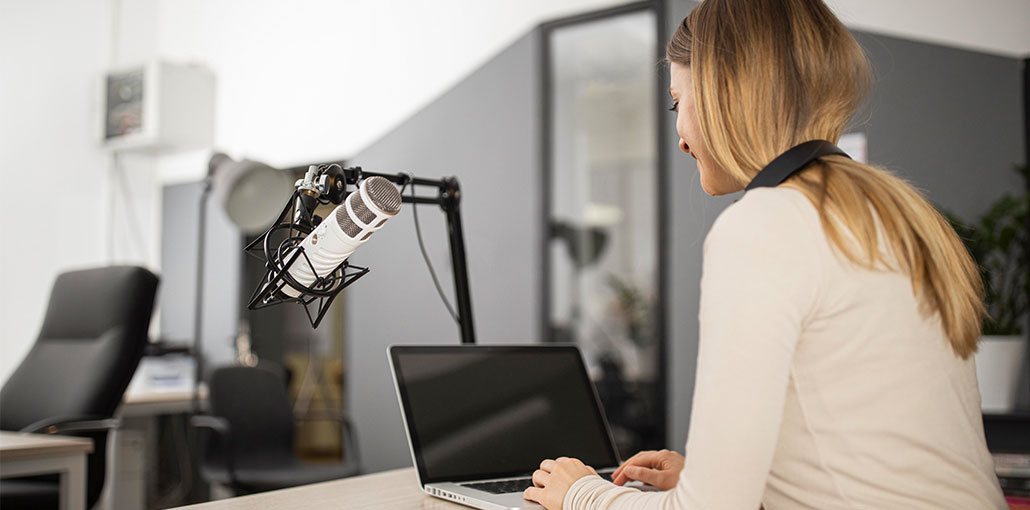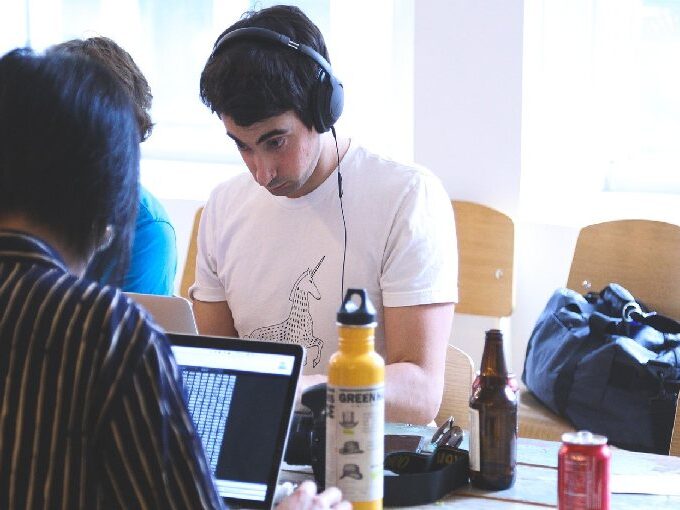Podcasts have evolved from a niche medium into a popular entertainment option that is comparable to traditional media. Over 55% of Americans listen to podcasts, while 37% listen monthly to podcasts.
Podcasts are a great way for content marketers to reach new audiences. Podcasting has a low entry barrier, so anyone can broadcast their ideas to a global audience.
How do you choose a podcast format?
If you aren’t sure where to start, ask yourself the following question: What content do my readers want?
This question will help guide your planning. To get a better understanding of what topics your audience is most interested in, you can use social media analytics and your website. You might consider creating a podcast that focuses on industry issues. A conversational podcast may be better if your audience prefers short, concise views on current events.
It’s not necessary to make a decision right away. We will guide you through some of the most popular podcast formats to help you see what is possible.
8 Types of podcasts
We understand that the podcast market is crowded, with more than 850,000 available at any given moment. How can you make your mark in a market with so many podcasts?
There is no reason to be discouraged. There are many podcasts, but that doesn’t mean you have the right strategy to be competitive with them all. You can find a niche audience that loves your content with the right strategy, regardless of how boring your industry might seem to them.
Choose the right format for your podcast is the first step to creating a podcast that appeals most to you. These 8 main types of podcasts are open to your personal interpretation.
Also read: What Business Podcasters Essential to Know About Social Audio Platforms
1. Interview podcasts
A podcast that features interviews usually has one or two hosts, who talk with one or more guests every episode. This format allows guests to share their unique insights or expertise on a topic, industry, or theme. This format can be broken down into two podcast formats:
- Expert interviews: Podcasts such as Reid Hoffman’s Masters of Scale focus on one topic where the interviewee has been a thought leader. A guest like Bill Gates could share his stories as a tech entrepreneur. This podcast is popular because it allows listeners to gain insight into a particular industry and help them to improve their careers.
- Entertainment interviews: Podcasts allow guests to share their stories. These shows are usually hosted by comedians and entertainment journalists. Noelle Stevenson, the showrunner, recently spoke on Queery with Carmen Esposito about her experiences in entertainment.
Podcasts that are interview-style can take a lot of research. Podcast hosts need to have the skills and knowledge to extract interesting stories from their guests. This format allows you to offer a variety of viewpoints and opinions.
2. Conversational podcasts
Podcasts that are co-hosted by two podcast hosts are very similar to radio shows. This format allows two podcast hosts to have fun discussing specific topics and themes. Co-hosts often discuss news stories that are trending and offer insightful or humorous commentary.
Conversational podcasts can also feature guests. podcasts studio’s Above The Fold podcast is hosted by Francis Ma and Jeff Baker. It often hosts guests from the content marketing world.
Podcasts require a lot of familiarity and comfort between hosts. The audience will know if the hosts aren’t friends or get along well. This format works best for hosts who are able to improvise and can not script conversations.
A conversational podcast can present some unique technical challenges. If the hosts live in different cities, special software will be needed to record their voices separately and then combine them.
3. Monologue podcasts
Monologue podcasts are where one host speaks for all of the episodes. Podcasts hosted by experts in a particular field are most often hosted by a person who is an expert in that topic. Listeners tune in to hear about specific topics or get informed opinions on current events.
The Philosophize It! podcast is one example. Stephen West, the podcast’s host, takes listeners on an exploration of the history and philosophy of the world. West begins with presocratic philosophy and gives an overview of the major movements in philosophical thought through the ages.
You can use this podcast to discuss any topic, but hosts must have sufficient experience and expertise to cover many episodes. It is possible to create a podcast that only covers one topic or issue. This is similar to serialized audiobooks.
Monologues have the advantage that you are not dependent on others. The host does not need to schedule guests or book them. This style requires some research.
4. Storytelling / investigative podcasts
Podcast listeners love podcasts that combine storytelling and investigative podcasts to create immersive experiences. Investigative podcasts allow podcast hosts to use every episode to tell a full story or a portion of an ongoing story.
Many podcasts that are non-fictional and story-based can be found. Dan Carlin’s Hardcore History podcast is one example. Carlin creates miniseries that are extremely well researched and take listeners on a journey through important periods in world history. Each miniseries is a culmination of months of research.
The other end of this spectrum is My Favorite Murder hosted by Karen Kilgariff & Georgia Hardstark. Each episode focuses on a particular case in great detail. The show is also well researched but offers more personal commentary.
Podcasts that are not fiction can be very resource-intensive. Podcasters who excel at this format have great research skills as well as a keen eye for entertainment value.
5. Roundtable podcasts
Roundtable podcasts, also known as panel shows or podcasts, are a group consisting of rotating hosts and regulars who provide commentary and discussion on a specific topic. The main host hosts each episode and the co-hosts take on specific roles. Some co-hosts might be more humorous, while others may offer more in-depth knowledge.
Panel shows are often designed to make audience members feel part of a private club. Listeners who have been listening for a while will be able to pick up on the in-jokes and personality quirks of the host better than those who are just starting to listen.
Roundtable podcasts reduce stress by dividing the workload among several people. The Joe Budden podcast features a former rapper as a co-host and guest. They discuss news, sports, and hip-hop.
6. Theatrical podcasts
Podcasts about fiction have been growing in popularity for many years. One host may be a theatrical podcast host, who tells a story in the same way as an audiobook. This format also uses a cast of actors and sound engineers to create immersive experiences.
Podcast hosts use this format to create imaginary worlds that entertain listeners. This format requires creativity and experience in order to keep listeners interested. This format isn’t as time-consuming as other formats, but it does require a lot more research. However, it also means that there is a lot of competition. These podcasts not only compete with each other but also with other entertainment forms such as audiobooks and movies.
7. Repurposed content podcasts
We love repurposing content at podcasts studio. Repurposing content can have many benefits. It can increase audience engagement and serve different needs in the sales funnel. Repurposing content gives you the opportunity to create new, exciting content.
News programs are the most popular in this category. You can have the same story in audio, video, and print. This format is great for brands who already produce lots of content for the internet. If you have a lot of content on your blog, each post could be turned into a podcast episode. This would allow you to double the content volume and reach a segment in your target audience who prefers audio content over written content.
8. Hybrid podcasts
Podcasts offer a flexible medium. To create your own style, you can combine the formats in this list. A podcaster who is an expert in a particular subject might host a monologue podcast and interview guests. A panel show may also split episodes into segments. This allows the main host to give a monologue.
You might even come up with your own podcast format! These are the best things about podcasting. The barriers to entry are much lower than those required to start a TV or radio program. You can even host episodes for free and upload them to major broadcast channels all from your smartphone.
Also read: 6 Reasons Why Video Content Marketing is Essential
What equipment do you need to start a podcast?
To start recording podcasts, you will need a smartphone. You only need a smartphone with a microphone and internet access to record and distribute your podcast. Podcasts recorded on mobile devices may sound unprofessional and tinny.
An equally good setup is a computer and microphone. To monitor your vocal level and create a show that sounds professional, you can download free or inexpensive software.
You will need to spend more money on professional equipment if you want to experience the Joe Rogan Experience.
- Stand microphones
- Acoustic foam
- Audio mixers.
- Pop filters
- Software for editing.
You will also need somewhere to record. It is a good idea to set up your recording studio in a quiet area. Marc Maron, who famously recorded his podcast WTF from his garage, even interviewed former President Barack Obama. Don’t be discouraged if you don’t have access to a studio.
How much budget does it take to start a podcast?
There are many factors that can affect the cost of producing a podcast. The barrier to entry for a solo podcast, with no equipment, can be as low as $0. Podcasters usually pay for podcast and website hosting. Your podcast files are not hosted by distribution networks like Spotify or Apple Podcasts. You’ll need to use services like Libsyn podcast hosting, Buzzsprout or Anchor SoundCloud, Captivate, or SoundCloud.
Start a podcast without equipment if you are starting from scratch. Expect to spend $50-$500 to launch your show. Many people started podcasts with nothing more than a dream and a smartphone.










Leave a comment